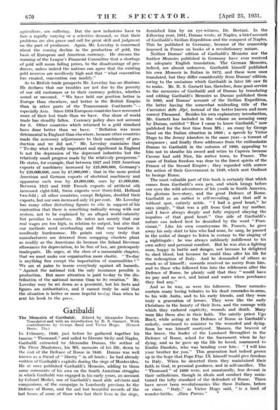Garibaldi
The Memoirs of Garibaldi. Edited by Alexandre Dumas. Translated and with an introduction by R. S. Garnett. With contributions by George Sand and Victor Hugo. (Ernest Bean. 21s.) Ix February, 1860, just before he gathered together his famous " Thousand," and sailed to liberate Sicily and Naples, Garibaldi entrusted to Alexandre Dumas, the author of The Three Musketeers, his MS. memoirs of his life, down to the end of the Defence of Rome in 1849. Dumas was well known as a friend of " liberty " in all lands ; he had already written of Garibaldi's exploits during the siege of Montevideo. He at once published Garibaldi's Memoirs, adding to them some comments of his own on the South American struggles in which Garibaldi was engaged in his early years, an account by Colonel Medici, one of Garibaldi's most able advisers and companions, of the campaign in Lombardy previous to the Defence of Rome, and the sad but beautiful records of the last hours of some of those who lost their lives in the siege,
furnished him by an eye-witness, Dr. Bertani. In the following year, 1861, Dumas wrote, at Naples, a brief account of Garibaldi's Sicilian Expedition and the conquest of Naples. This he published in Germany, because of the censorship imposed in France on books of a revolutionary nature.
Neither Dumas' edition of Garibaldi's Memoirs nor the further Memoirs published in Germany have ever received
an adequate English translation. The German Memoirs,
indeed, are almost unknown. Garibaldi himself published his own Metnorie in Italian' in 1872, and these were once
translated, but they differ considerably from Dumas' edition, owing to the omissions which Garibaldi in 'later life saw fit to make. Mr. R. S. Garnett has, therefore, done good service to the memories of Garibaldi and of Dumas by translating and editing Garibaldi's Memoirs as Dumas published them in 1860, and Dumas' account of the Sicilian Expedition, the latter having the somewhat misleading title of the
Cacciatort delle Alpi, instead of the better known and more correct Thousand. Besides his own explanatory introduction,
Mr. Garnett has included in the volume an amusing essay by Dumas, entitled " How I came to know Garibaldi," now published for the first time from MS. ; an essay by George Sand on the Italian situation in 1860 ; a speech by Victor Hugo to the Jersey islanders in the same year—a torrent of eloquence ; and finally three addresses from the enthusiastic Dumas to Garibaldi in the autumn of 1860, appealing to him not to sheathe his sword and retire to Caprera because Cavour had sold Nice, his native town, to France. The cause of Italian freedom was dear to the finest spirits of the France of the Second Empire ; they regarded with sorrow the action of their Government in 1849, which sent Oudinot to besiege Rome.
The most valuable part of this book is certainly that which comes from Garibaldi's own pen, and which brings before our eyes the wild adventures of his youth in South America, his glorious love-story, and the great Defence of Rome.
Garibaldi as an author is self-revealing, and that self is without spot, entirely noble. " I had a good heart," he
says simply, " that was a gift from God and my mother, and I have always deeply and fully enjoyed obeying the impulses of that good heart." One side of Garibaldi's nature can indeed best be described by the word " Fran- ciscan." Like his own countryman St. Francis, he gave away his only shirt to him who had none, he sang, he paused in the midst of danger to listen in ecstasy to the singing of a nightingale ; he was always sublimely indifferent to his own safety and personal comfort. But he was also a fighting man, happy in battle and danger, not because he delighted to shed blood, but because he could thus offer his life for the redemption of Italy. And he demanded of others as much as of himself ; cowards received no mercy from him, and to those who followed him into the wilderness after the Defence of Rome, he plainly said that they " would have no pay and no rest, and bread and water when perchance they find any."
And as he was, so were his followers. These memoirs contain many loving tributes to his dead comrades-in-arms, to his wife Anita, and to his early friends, and they were truly a generation of heroes. They were like the early Christians in the beauty of their lives, and the courage with which they endured captivity, wounds and death. Many were like them also in their faith. The saintly priest Ugo Basd, while acting at the Defence of Rome as Garibaldi's orderly, continued to minister to the wounded and dying. Soon he was himself martyred. Manara, the bravest of the brave, the leader of the Lombard Bersaglieri in the Defence of Rome, asked for the Sacrament when he lay dying, and as he gave up the life he loved, murmured to Emilio Dandolo, who was bending over him : " I will kiss your brother for you." This generation had indeed grown up in the hope that Pope Pius IX himself would give freedom to Italy. When he deserted them they maintained their faith in God, in personal goodness, and in self-sacrifice. The " Thousand " of 1860 were, not unnaturally, less devout in their catholicism, though in ideals and conduct they main- tained the lofty standard of the defender' of Rome. There have never been revolutionaries like these Italians, before or since. " Italy," as Victor Hugo said,. ".is a land of wonder-births. Alma Parens."






































 Previous page
Previous page